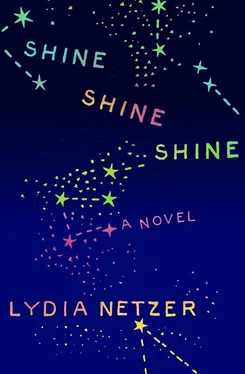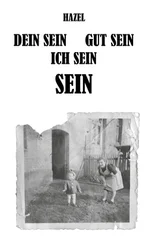Outside in the parking lot, the bald daughter and the granddaughter inside her were sitting in the car. Sunny could not stay entirely away, but she could not go entirely inside. She could not make her feet carry her into the hospital, and yet when the car was running, the turns that led to there were inevitable. A few times she drove past and did not make that final turn in. Or she would go in and park, but not enter the building. She could feel the connection, through the window she thought might be her mother’s death chamber, one of fifty rectangles in the brick.
She imagined that after the baby came out, she would put Bubber and the baby in the house and leave Rache with them. With Rache in the house, alone with the children, the cracks in the walls would recede. The children would be safe. She could go back to the hospital, to the mother, and sit beside her, breathe warm air into the room where she lay. She hoped that a nurse was doing this in her absence. That someone would have pity on the dying woman whose bitch daughter had abandoned her to die alone. Well, she’s pregnant. Well, she’s bald. Well, she’s got a lot going on. That child. That man. Still, inexcusable, the nurse would say, and press her mother’s swollen hand. Sunny hoped.
* * *
THERE WERE TIMES DURING Maxon’s childhood when he spent every day with her. But then, when they were playing, Maxon would look up at the clock, see that it was after 4:30, and begin to run as fast as he could for home. His dad would get home at 5:00, he said, and he had to be there, to work. Having his son over across the way was galling to the father, unbearable.
His father was suspicious of Emma and her intentions. “What do they want with you, boy?” he would say. “They want a boot boy? They want somebody to send down the wells?” His father was also suspicious about the brown woman that lived with them in their house. Nu was an anomaly, the only person in the county who wasn’t “white.” While most of the neighbors accepted her and asked her patient questions about where she had lived in Burma, others never believed she wasn’t just a common Negro. Maxon’s father was one of these, and talked with spit flecks on his lips about the evils of letting a Negro or a Mexican take root in the county. The truth was that Nu had come from Burma to help Emma raise Sunny because Emma was pretty sure she shouldn’t do it by herself.
When Emma returned from Burma, she wanted, most of all, to raise Sunny in an environment tolerant of eccentricities, where she could be as normal as possible. She could think of no better place for Sunny than the obscure, detached, rural county where Bob Butcher had grown up. Bob had always talked about it, rhapsodized about it, its tiny pointed country churches, its oil wells everywhere. Emma knew that if she took Sunny to Yates County, Sunny would be one of them, a family member. She would become a local fixture, like the people Bob had laughed about with the perpetual garage sale outside their house, or the eccentric millionaire, holed up in a stone mansion on a hill, who had invented Post-its. Her people were there. She would be at home.
She bought the Butcher farm from Bob’s parents. They were happy to sell it to her; they had long since moved to Florida, where they could be in the sun and near their other son, the good son who hadn’t gone off and gotten killed for being a missionary. Selling the farm to Emma meant being done with her and her odd child, so they did it without hesitation.
Emma was constantly on the phone and downtown in the lawyer’s office, caught up in legal matters and the sale of Bob Butcher’s chemical formulas to pharmaceutical companies. The shrewd deciphering of years of scribbled notes and research documents, all cover for his work as a missionary, had yielded her several interesting findings. These turned out to be of significant value to modern medicine. After the patents had all been drawn, the documents had all been signed, she came away a rich woman, able to live where she liked and do as she pleased.
So Emma set up camp in the old farmhouse, and sent for Nu from Burma. Nu came with her nats and her animist creeds, and her sturdy legs. She planted pounds on pounds of beans in the summer, hoeing endlessly and pulling in bushels of vegetables to can. She shot her rifle to scare off crows, shot her rifle to scare off a deer, shot her rifle to scare off a handful of people in the middle of the night, escaped from Warren State Hospital, and circling the house making mooing sounds like loose cows. She cooked, cleaned, and slept hard in the back room, her rifle and her shrine beside her bed. She worked endlessly with Maxon on identifying facial cues, reading body language, understanding the meaning of words like “regretful” and “obvious.” They practiced sounding like English was their first language. For Nu, it was vocabulary that got in her way. For Maxon, it was syntax.
Sometimes there were stretches of time where his father would go on a trip and leave the older brothers to run the farm. Those were the good times. Then Maxon was free. Once his mother had even left town, leaving Maxon, at the age of nine, without a parent for two weeks. During this time, he stayed with Emma and Sunny, but he slept on the porch, where he was more comfortable. Sunny tucked him up like a doll before she went to bed, brought him a book and a bedside lantern. “You turn out that light before you go to bed, Maxon,” Emma would say, before shutting the door. Still in the morning the light would always be on, the book collapsed on his chest, and a hundred moths stuck in the lantern, trying to get out. Nu fed him prodigiously when he stayed with them, and he went away just a little bit fatter, not so sticklike.
When Maxon’s father, Paul Mann, was home, those were the bad times. Maxon’s father was a tall gruff man, hunched and neckless. His pants hung down from suspenders on his bony shoulders. He had a gray beard half grown and a half circle of sweat appeared around the neck of his yellowed T-shirt. He was constantly in motion, always muttering, his watery eyes blinking rapidly. He had many projects: lumbering, tinkering, drilling for oil, hunting, and trapping.
It was unclear to Emma if the family had money problems or if their lifestyle was chosen by preference. The man always seemed so busy, he couldn’t be a deadbeat, and yet they hardly spent money—Maxon and his older brothers were usually in rags or close to it, the house was falling down, and the barn leaked. The hundred or so dilapidated vehicles across the pastures were used as sheep pens, pigpens, and storage for other auto parts and pieces. Maxon’s father was a proud hoarder, filling his garage, his barn, his outbuildings, and his house right to the rafters with things he might need in the future—tools, parts, scraps, animals, and sons.
Bob Butcher’s parents had had a charged relationship with this obstreperous neighbor, frequently finding him or one of his shady cousins cutting timber over the other side of the hotly contested property line. The older sons spent their Saturday nights drinking home brew and cruising the back roads in one of their old clunkers with the lights off. You could hear them crashing into trees, spinning their tires in the gravel, and honking the horn in the darkness.
Emma tried to leave the Manns alone, knowing instinctively that Maxon would bear the brunt of any conflict. Once, however, Emma literally ran into them in a car. She had Maxon and Sunny in the back, Nu in the front, and they were all headed out for ice cream, after which she planned to return Maxon to his house. She would get him there in time to be at work at 5:00 p.m. as usual, to avoid his father’s anger. They were winding down the dirt road toward the river, where the tires inevitably skidded and the road dipped and skipped without warning. Suddenly, Paul Mann’s truck came roaring up out of the valley, and smashed directly into the front of Emma’s little Honda Accord. The truck slid back then, slipping on gravel, and banged into a tree. It dangled perilously close to the edge of the hill, but it was firmly stuck. Mann stomped the gas, stomped again, sending up a spray of rocks and dirt. But the truck was immobilized. He hopped out quickly, began pacing; his fat wife slid out of the passenger side, instantly crying and picking at herself. She was a humble figure, dim in her eyes and thin in her hair.
Читать дальше









